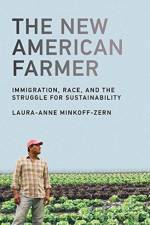- Immigration, Race, and the Struggle for Sustainability
av Laura-Anne (Assistant Professor Minkoff-Zern
405
An examination of Latino/a immigrant farmers as they transition from farmworkers to farm owners that offers a new perspective on racial inequity and sustainable farming.Although the majority of farms in the United States have US-born owners who identify as white, a growing number of new farmers are immigrants, many of them from Mexico, who originally came to the United States looking for work in agriculture. In The New American Farmer, Laura-Anne Minkoff-Zern explores the experiences of Latino/a immigrant farmers as they transition from farmworkers to farm owners, offering a new perspective on racial inequity and sustainable farming. She finds that many of these new farmers rely on farming practices from their home countries—including growing multiple crops simultaneously, using integrated pest management, maintaining small-scale production, and employing family labor—most of which are considered alternative farming techniques in the United States.Drawing on extensive interviews with farmers and organizers, Minkoff-Zern describes the social, economic, and political barriers immigrant farmers must overcome, from navigating USDA bureaucracy to racialized exclusion from opportunities. She discusses, among other topics, the history of discrimination against farm laborers in the United States; the invisibility of Latino/a farmers to government and universities; new farmers'' sense of agrarian and racial identity; and the future of the agrarian class system.Minkoff-Zern argues that immigrant farmers, with their knowledge and experience of alternative farming practices, are—despite a range of challenges—actively and substantially contributing to the movement for an ecological and sustainable food system. Scholars and food activists should take notice.

